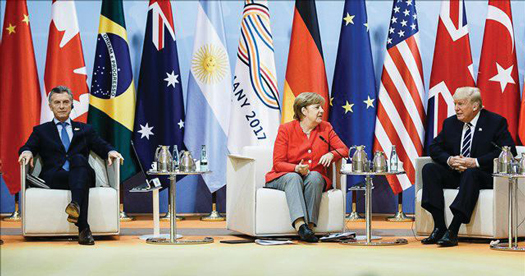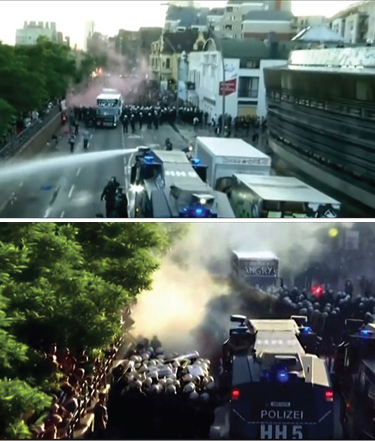Trump, America Shrinking On World Stage?
By Askia Muhammad -Senior Editor- | Last updated: Jul 12, 2017 - 1:06:03 AMWhat's your opinion on this article?

German Chancellor Angela Merkel before the start of the G20 Summit with the President of Argentina, Mauricio Macri, and U.S. President Donald Trump, July 7. Photos: MGN Online
|
WASHINGTON—The reputation of United States, long thought of as an imperial super power and world bully, has literally deteriorated in the six months of the presidency of Donald J. Trump. The world is less secure, and there is a fast escalating threat that war might again erupt on the Korean Peninsula.
The president, under criticism for requiring “on the job training” had three major challenges: emerging unscarred from his first face-to-face meeting with Russian President Vladimir Putin; winning some international cooperation to reign in North Korea’s aggressive nuclear ambitions; and to soften the impact of U.S. hostility to the Paris Accord, the global climate agreement from which the Trump administration withdrew.
More than 100,000 protesters flooded the streets of Hamburg, Germany as leaders of the world’s largest economies gathered for the G20 summit. Marchers carried banners reading “Welcome to Hell” and “The World is Not for Sale” and were met by heavily armed riot police, who used water cannons, tear gas and stun grenades to disperse the protests.

Protesters clash with police outside G20 Summit.
|
In a slap to U.S. prestige, Brazil, Russia, India and China—the so-called BRICS countries—called on the G20 to push for implementation of the Paris climate deal, despite Mr. Trump’s decision to pull the United States out of it. “We know the United States has withdrawn from the Paris Agreement. All others—or, at least as far as I know, many, many others—are still committed to the Paris Agreement,” German Chancellor Angela Merkel, said as the talks opened.
During much of the proceedings, Mr. Trump sat isolated and alone. By the summit’s end, in a break with longstanding tradition, Mr. Trump left without holding a press conference. He was one of the only world leaders to do so.
At his post-summit press conference, Russian President Vladimir Putin claimed that President Trump accepted his denials of Russian hacking and interference in the 2016 election when the two leaders met in private. Mr. Putin, according to the Associated Press, confirmed what Secretary of State Rex Tillerson told reporters after the meeting: that Mr. Trump asked Mr. Putin multiple times about accusations that Russia interfered in the U.S. presidential election on his behalf.
Mr. Putin asserted that he thinks his answers denying allegations of Russian meddling “satisfied” Mr. Trump. “It seems to me that he has taken note of that and agreed, but it’s better to ask him about his attitude,” Mr. Putin said, according to AP, adding that “Moscow and Washington would be able to improve their ties if the two countries keep relating the way he and Trump did.” U.S. officials denied this account of the meeting, but did so anonymously instead of in public, on the record press conference.
Little progress was announced concerning the Korean tensions, but the two countries announced a joint effort to stabilize the raging civil war in Syria.
“It is fairly clear to some observers, that the United States is not in as strong a position in the group of 20 as it was, say a year ago, or even a half a year ago,” Edward Peck, retired former U.S. ambassador to Iraq, said in an interview. “So many things have been changed, and so many additional changes have been threatened, that I think a lot of people who are friends of ours, and will remain friends of ours, are deeply concerned about where we are headed, and what it might mean for them. President Trump’s behavior in office is directly responsible for the decline in U.S. respect overseas, according to Ambassador Peck.
“Our leaders have made some statements that indicate that those issues are not as important to us, as they are to them, and this always causes problems.
“There were a lot of people waiting for an opportunity to have this decline” in U.S. hegemony to take place. “In the same sense that here in the United States you’ve had people rush out and express very strongly held opinions, which many of us had thought had been gotten rid of for a long time, some of the hate organizations, for example.”
The enthusiastic reception Mr. Trump received at a carefully choreographed speech in Poland is an example of how anti-immigrant, White, nationalistic, tribal, instincts have increased in Europe in the wake of Mr. Trump’s victory.
In a major speech in Poland Mr. Trump said the future of Western civilization is at stake, as he warned against the threats of terrorism and extremism. “This continent no longer confronts the specter of communism, but today we’re in the West, and we have to say there are dire threats to our security and to our way of life,” Mr. Trump continued.
“You see what’s happening out there. They are threats. We will confront them. We will win. But they are threats. We are confronted by another oppressive ideology, one that seeks to export terrorism and extremism all around the globe. America and Europe have suffered one terror attack after another. We’re going to get it to stop,” he said.
Mr. Trump’s speech was often interrupted by applause. According to news reports, supporters of the right-wing Polish government were bused in to hear Mr. Trump’s speech. Poland has one of the furthest-right governments in Europe and is currently defying European Union rules by refusing to allow refugees into Poland.
Despite the warm reception Mr. Trump’s message receives in xenophobic strongholds like Poland, his is a near doomsday scenario to others. “So if the United States shows some signs of deviation from what we’ve been talking about before, we have people ready to say, ‘Yes. Yes. Let’s get ‘em.’ But we have been, stoking the fire with things that our leaders have said and things that they have implied, and things that they have threatened to change,” Ambassador Peck warned.
The Trump message “is more of a downbeat, than an upbeat stance that he has taken. A lot of people recognize the problems to which he is referring. They do not necessarily consider them to be an end of the world, type thing.
“But there are deep and growing concerns about all of the strange, unusual, and unexpected and undesirable things that have happened, and there are people ready to blame it on us,” said Ambassador Peck.
“I mean, why not? We’ve been the leader of the Free World, the West, for the last several decades, and a lot of people resented that, as we behaved in what some people called an imperialistic fashion, doing whatever we wanted, wherever we wanted, because no one felt it necessary to stop us, and now that is a switch from what we’re doing now, in which we’re telling everybody, the end is near and if you don’t do this the way I say, then civilization will collapse. I think, I hope, that that is grossly overstated, overestimated, and highly unlikely,” he concluded.
INSIDE STORIES AND REVIEWS
-
-
About Harriett ... and the Negro Hollywood Road Show
By Rabiah Muhammad, Guest Columnist » Full Story -
Skepticism greets Jay-Z, NFL talk of inspiring change
By Bryan 18X Crawford and Richard B. Muhammad The Final Call Newspaper @TheFinalCall » Full Story -
The painful problem of Black girls and suicide
By Charlene Muhammad -National Correspondent- » Full Story -
Exploitation of Innocence - Report: Perceptions, policies hurting Black girls
By Charlene Muhammad -National Correspondent- » Full Story -
Big Ballin: Big ideas fuel a father’s Big Baller Brand and brash business sense
By Bryan Crawford -Contributing Writer- » Full Story






 Click Here Stay Connected!
Click Here Stay Connected!








